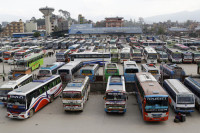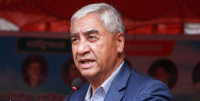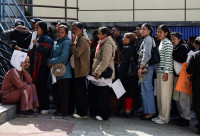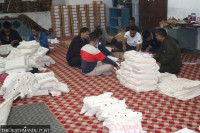National
Single women and disabled people decry government’s decision to cut their social security allowance
Rights activists demand the government to withdraw its ‘irresponsible’ decision, which could put thousands of vulnerable people at risk of extreme poverty.%20(7).jpg&w=900&height=601)
Anup Ojha
Prem Maya Maharjan does not know how she will take care of her granddaughter after the government decided to discontinue social security allowance for single women under 60 years of age.
The 54-year-old single woman from Pulchowk, Lalitpur, is unemployed these days. The garment factory where she worked was closed down after the government enforced a nationwide lockdown on March 24.
Out of job, her only safety net was the allowance that the government had been providing for the vulnerable groups like single women, elderly and disabled. Maharjan used to get Rs 2,000 as monthly allowance, which was issued every four months by her local ward office.
Now, with the benefits cancelled, Maharjan is at risk of falling into extreme poverty.
Ever since the lockdown, Maharjan and her granddaughter have been living off the food relief provided by the local government of Lalitpur Metropolitan City.
“If only I had got the allowance money, our life would have been much easier during these trying times,” Maharjan said.
The government has decided to discontinue the allowance for single women below 60 years of age in line with the Social Security Act 2018.
As per the section 7 of the Act, to become eligible for social security allowance, including single women under 60 years old, one needs to prove that they have no source of income or have fixed income below the threshold determined by the government.
After the government implemented the law by issuing a notice in March, single women under 60 years have been deprived of the social allowance provision.
The government has been providing benefits to single women above the age of 60 since 1994. Single women under 60 years were also included in the social security allowance programme in 2009, as per the Supreme Court’s verdict that ordered the government not to discriminate single women based on their age.
Maharjan’s husband passed away 20 years ago. She says her son is a drug addict, whose wife eloped with another man a long time ago, and it is up to her to raise her granddaughter.
“Without job and government allowance, I don’t know what to do. I have a tiny house just enough for my family. There is no source of alternative earning,” Maharjan said.
She hopes the government will reconsider its decision.
The government’s decision not only deprives single women under 60 years from getting social security allowance, but also those disabled persons whom the state deems fit to function in the society.
As per the section 8 of the law, only the citizens whose physical and mental impairments hinder them from effective participation in social life are eligible for allowance.
Dipendra Shakya, a 40-year-old disabled man from Bhaktapur, does not qualify for social security allowance under the new law. He is mobility challenged and has difficulty speaking. But the state does not recognise his disability as an adequate hindrance for him to rely on benefits.
Shakya’s family has been living in Imadol, Lalitpur, for the past four years after their family home was destroyed by the 2015 earthquake.
“The government was providing Rs 12,000 every four months as his allowance. The amount was of huge support for his care and wellbeing,” said Maya Shakya, Shakya’s 70-year-old mother.
She said her son’s allowance stopped coming two months ago.
Data at the Department of National ID and Civil Registration show there are as many as 778,000 single women and widows and nearly 150,000 disabled persons.
According to the National Federation of Disabled People around 80,000 people with disabilities will be deprived of social security allowance under the new law.
The government has argued that its decision was aimed at curtailing the growing spending on social security. During the period between 2012 and 2016, Nepal’s spending in social protection stood at 1.7 percent of its Gross Domestic Product, which is higher than the average one percent of GDP in South Asia and the global average of 1.6 percent, according to the World Bank.
During this period, Nepal spent just 1.17 percent of GDP in the health sector.
In the last fiscal year 2018-19, the government spent 3.8 percent of its total expenditure in social security against 3.25 percent in health and 3.26 percent in education.
The government’s decision to cut the social security allowance has drawn widespread criticism from women rights groups and organisations working for the disabled.
Women rights activist Saru Joshi Shrestha said the government's decision was random and a blatant display of irresponsibility.
“The government announced its decision without consulting with stakeholders. The government is trying to disempower the people who are already vulnerable in the time of crisis,” said Shrestha.
She questioned the government to cut allowances of parliamentary leaders.
Sudarshan Subedi, former president of National Federation of Disabled-Nepal, said the government's decision was tantamount to making disabled people stateless.
“Monthly allowance is the only means of survival for many disabled persons. The government’s decision to cut the social security allowance from them shows that there is no state for the poor and vulnerable groups in this country,” said Subedi.
In the wake of criticism, the Law, Justice and Human Rights Committee under the House of Representatives on Monday instructed the government to take immediate steps to ensure that single women and disabled people are not deprived of their allowance.
Gyanendra Paudel, spokesperson for the Ministry of Women Children and Senior Citizen, said work was underway to amend the Act to resolve the issue.
“Following the concerns raised by single women and disabled people, the Home Ministry is preparing to make amendments to the Social Security Act. I hope the issue is sorted soon,” said Paudel.
Well before the government announced its new decision, many single women and disabled people in different parts of the country were deprived of the state allowance.
More than 1,200 senior citizens, disabled and single women were deprived of their social security allowance for a whole year in Bhagwanpur Rural Municipality in Siraha after the local government failed to distribute the amount in time.
Rather than denying benefits to vulnerable groups, rights groups say the government should work towards making its social security system more robust and comprehensive.
Prithvi Shrestha contributed reporting.




 21.3°C Kathmandu
21.3°C Kathmandu.jpg)














